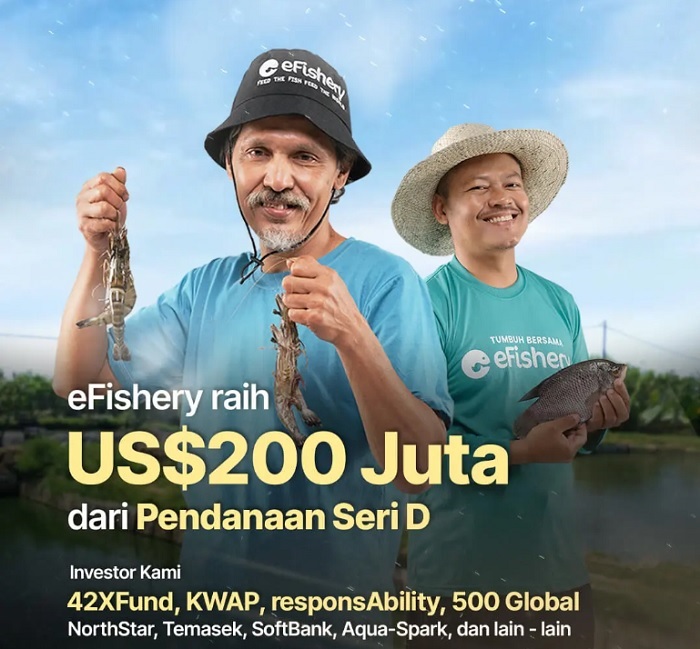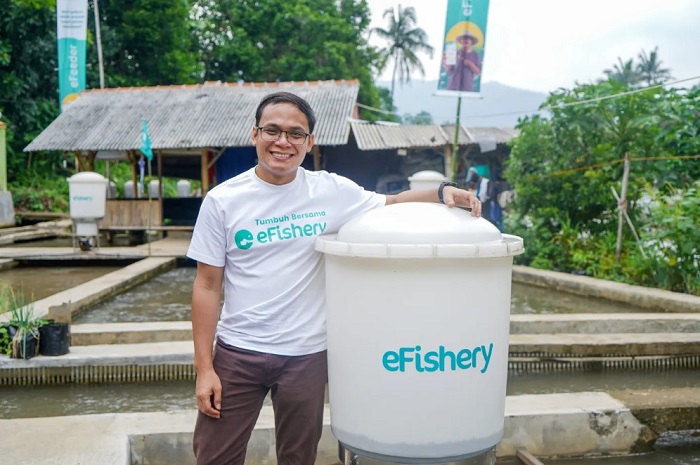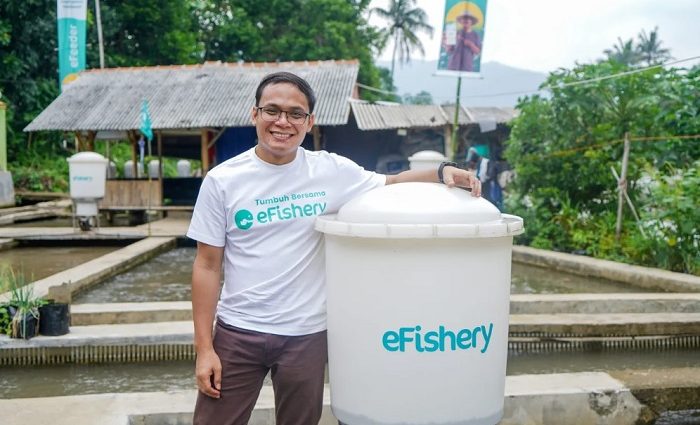- Led by 42XFund from Abu Dhabi, with Malaysia’s KWAP, 500 Global & others
- eFishery contributed 1.55% of Indonesian aquaculture sector GDP in 2022

eFishery, an aquaculture company from Indonesia, announced it had raised US$200 million (RM931.6 million) in Series D funding last week to accelerate its target of developing the cultivator community in Indonesia and increasing transactions in eFishery.
The funding round was led by 42XFund (a global investment management company based in Abu Dhabi) and supported by KWAP (Malaysia’s largest public sector pension fund), responsiveAbility (Swiss-based asset management company) and 500 Global. Early eFishery investors like Northstar, Temasek, and Softbank also participated. Goldman Sachs was the exclusive funding advisor.
eFishery founder and CEO Gibran Huzaifah (pic, below), who founded the company in 2013 in Bandung and once said that the early group of fish farmers only agreed to try his solution because “they pitied me” has now built the company into the first unicorn valued aquaculture company in the world. On the funding round, he said, “Currently, aquaculture is the fastest growing sector in the global fishing industry. The strategic support we receive from investors will help eFishery revolutionise the entire industry by integrating small-scale fish and shrimp farmers with the eFishery ecosystem that covers the whole aquaculture business value chain.”

eFishery currently serves 70,000 fish and shrimp farmers in 280 cities across Indonesia and Gibran said the funding will be used for community development of fish cultivators and shrimp farmers from eFishery, which targets more than 1 million aquaculture ponds in Indonesia by 2025.
Principal from 42XFund, Faith Adiwibowo said, “We believe in the vision of eFishery and are interested in becoming a key partner who adds value and contributes to the company’s growth. Other aquaculture technologies and solutions provided by eFishery have had a significant impact on the aquaculture technology industry, as well as providing benefits for small cultivators in Indonesia. We also believe that eFishery can continue contributing to realising an inclusive and sustainable economy while simultaneously playing a role in preserving the environment in Indonesia and even the world.”
.jpg) “Some think that the whole world is copying Silicon Valley,” said Managing Partner from 500 Global, Khailee Ng (pic), “However, I guess eFishery has proven to be unique in terms of business model innovation, as demonstrated by its achievements in three areas at once, namely, scalability, sustainable growth, and profitability that have been produced consistently over the years, even before becoming a company with a valuation of over US$1 billion (RM4.66 billion). It is this business model that needs to be presented in Silicon Valley.”
“Some think that the whole world is copying Silicon Valley,” said Managing Partner from 500 Global, Khailee Ng (pic), “However, I guess eFishery has proven to be unique in terms of business model innovation, as demonstrated by its achievements in three areas at once, namely, scalability, sustainable growth, and profitability that have been produced consistently over the years, even before becoming a company with a valuation of over US$1 billion (RM4.66 billion). It is this business model that needs to be presented in Silicon Valley.”
Rik Vyverman, Global Head of Sustainable Food Equity for responsiveAbility Investments AG, which is also an impact investor from Zurich, adds, “The eFishery business model that shortens the supply chain can continue to disrupt the traditional aquaculture market in Indonesia and the world. The Sustainable Development Goals (SDGs) target will also be achieved more along with the growth of eFishery.”
Based on the latest research from the Demographic Institute, Faculty of Economics and Business, University of Indonesia (LD FEB UI), eFishery has contributed US$2.242 billion (IDR3.4 trillion) or the equivalent of 1.55% to the GDP of the Indonesian Aquaculture sector throughout 2022. The integrated ecosystem of eFishery, which covers marketplace and platforms sales of fish products, shrimp products, and services to access finance, has supported more than 70,000 cultivators and farmers throughout Indonesia.
eFishery has disrupted the aquaculture industry by presenting digital solutions auto feeder based Internet of Things (IoT), designed to increase the accountability, efficiency, and convenience of the fish farming business. The technological approach adopted by eFishery taps data-driven sensors to measure fish movement and acoustics from shrimp, optimising feeding, fish health, and water quality while reducing overall waste.

